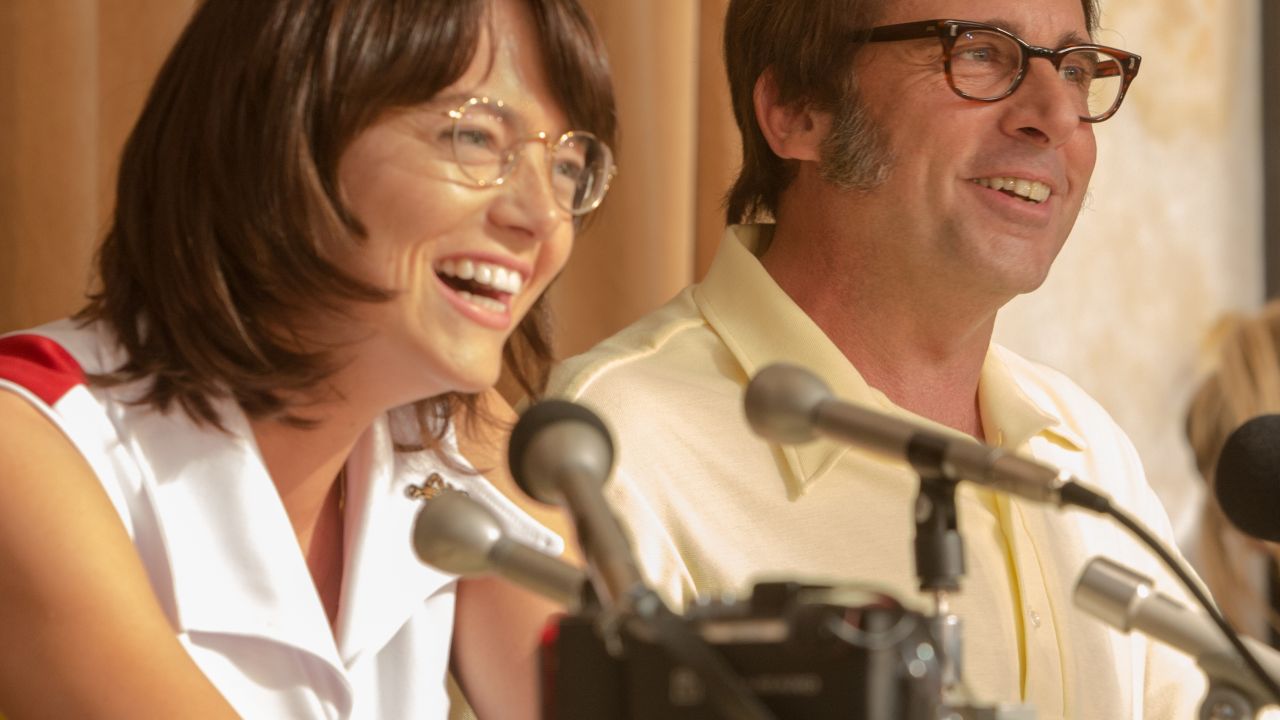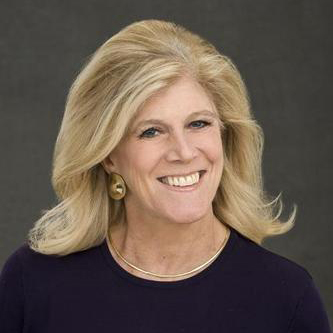
Emma Stone as Billie Jean King and Steve Carell as Bobby Riggs in Battle of the Sexes. (Photo by Melinda Sue Gordon. © 2017 20th Century Fox Film Corporation)
Midway through Bobby Riggs’ cocky telephone pitch to Billie Jean King in 1973 — a nationally televised tennis match with a $100,000 prize between her, the top-ranked female player, and himself, the fading superstar — Riggs brands the event. “Male chauvinist pig versus hairy-legged feminist,” he says, succinctly defining the cultural stakes. Although Riggs instantly walks back his hustle with a glib, “No offense,” it sets the terms. Yes, Riggs, 55, needs the money (and the renewed fame); and yes, playing against the eye-popping King, 29, will make for great tennis and must-see TV. But this is a boy-girl smackdown, a commercial appeal to the gender wars then agitating the country.
King, beyond offended, ultimately agrees to defend her titles and her sex. After she sets him straight. “By the way,” she says quietly, “I shave my legs.”
That scene, in Battle of the Sexes, the smartly engaging and depressingly relevant new movie about the match starring Emma Stone and Steve Carell, is a blast from the past loaded with lessons for the future, an eerie reminder that today’s rebloom of sexism is a scary echo of decades — actually, centuries — of innate and cultural misogyny. And it’s a handy playbook to get through our current crisis. Crises.
Full disclosure: I was one of those 1970s “women’s libbers” (a derisive term that we tactically co-opted) judged more for the silkiness of our lower limbs than the capacity of our brains. Judged, that is, by some men (mostly men) terrified about a social upheaval that would restrict their historic privilege. Men who believed that women who shunned everything from razors to rouge on the path to liberation — a choice made by some to be taken seriously, not as a sex object — were alien and ugly beings.
Dopey? Yup. Rational? Nope. But that’s what we were up against.
It was a time when women earned 57 cents to every dollar that a man took home. Way worse for a tennis pro, which is why King had led the revolt to give women a league of their own.
It was a time when Freud’s “biology is destiny” was still mainlined by the patriarchy, confining women to the kitchen and the bedroom despite other obvious talents. As one male character in the movie opposing King’s plea for equal prize money says smugly, “The men are simply more exciting to watch. That’s just biology.”
A time when ABC Sports superstar Howard Cosell, announcing the tennis circus that night from the Houston Astrodome, noted, as King was struggling to recover from a series of lost points, that she was “walking more like a male than female.” Whatever that meant.
It was 1973, when marriage was still so cherished as a woman’s most respectable career that The New York Times, reporting the match of the century (front page, below the fold) between a self-described “male chauvinist pig” and a fiercely competitive feminist, quaintly called her “Mrs. King.” Even after she crushed the sassy hustler in three straight sets (6-4, 6-3, 6-3).
As a young woman cheering the spectacle at a New York watch party, along with some 90 million prime-time viewers around the world, I knew I had seen the future. So, of course, did King.
“I think this match will do great things for women’s tennis,” she said afterward, underestimating her impact. “I’ve always wanted to equalize things for us. …And I think we’ll find in the next decade that women athletes will finally get the attention they deserve.”
King soon expanded her vision to equality in all fields, for any gender. As she told me in a phone conversation this week, “A lot of young men watching the match became the first generation of men committed to the women’s movement. So that was really good, too.”
So, game, set and match, right?
Alas.
In the four-plus decades since King’s victory helped lob all women toward parity and beyond — a time during which she has continually pushed against barriers on and off the court as glass ceilings and macho attitudes started falling — women are still being thwarted and patronized by modern versions of Bobby Riggs, without his occasionally redeeming humor and period-accurate sideburns.
In Silicon Valley, charges of sex discrimination and sexual harassment have sparked widespread soul-searching among male tech management.
In the newly stocked swamps of the Capitol, “man-terrupting” led House Minority Leader Nancy Pelosi, no shrinking violet, to ask the 10 men sharing a White House dinner table, “Does anybody listen to women when they speak around here?”
How can it be, asks The Washington Post’s Ruth Marcus, “that only four of 23 Cabinet-level staff members are women, half the number of the first Obama Cabinet? How can it be, in 2017, that of Trump’s 42 nominees for US attorney positions, only one is female?”
The challenges from today’s bigmouths are being served up with irritating spin.
Nearly a decade before Serena and Venus Williams were born, Billie Jean King was ridiculed for daring to suggest that women could draw audiences on the tennis court. Just recently, the Twitterverse erupted over the presence of Beth Mowins, the first woman to call a Monday Night Football game. Most of the criticism was about — you guessed it — her voice, something many men think many women can never get right.
Or, as the once discredited Brian Williams ineptly asked a guest on MSNBC, starting off a segment on Hillary Clinton’s just-aired interview with Rachel Maddow about her new memoir, “Is she more strident than what you are used to?”
Seriously?
Never mind what’s inside the book. The very existence of What Happened has been questioned. “Was this book necessary?” asked Los Angeles Times columnist Doyle McManus. Better, he advised, to have stowed it “in a desk drawer.”
Fox News’ Greg Gutfeld snarled, “She’s past her sale date,” adding that Clinton should “shut up and go away.” One week later, the book leapt to the top of the best-seller list.
Others have criticized the former secretary of state and presidential candidate for using the book to blame her loss on sexism. For not being angry enough that Trump beat her. One Twitter response captured the eternal Rorschach she represents: “Why isn’t Hillary angrier? Why isn’t Hillary taller? Why isn’t Hillary a dinner plate?”
Me? What I’ve read reveals a more liberated and spirited woman than we’ve seen, with some l’esprit de l’escalier revelations that remind me what we missed. I lament that Clinton did not go with her gut during that second presidential debate — when Donald Trump invaded her space and stalked her like a bad dream — and say what we all felt: “Back up, you creep. Get away from me.”
It’s all frustratingly familiar, but this time, the over-the-hill clown won.
Billie Jean King, a devoted reader of history, believes progress in women’s equality, like everything else, is cyclical. “Every generation has to do it themselves,” she told me. “The pendulum is always swinging back and forth.” And misogyny, she says, starts at the top. “When the leaders are sexist it allows people to be mean again. And I don’t like it.”
She didn’t need to specify the abominable treatment of women and women’s issues from the leader-in-chief. The man whose own vulgarity and cheesy talk has slapped a PG-13 rating on presidential comments, enabling boors like Fox Sports analyst Clay Travis to say on CNN: “I believe in only two things completely: the First Amendment and boobs.” When the stunned anchor, Brooke Baldwin, finally processed what she’d heard, she pulled the plug on the interview.
It would be a stretch to compare every tiny such act of rebellion to the game-changing smashes Billie Jean King has made for women in sports, but that’s how it works. One point, or step, at a time. The will to fight back. The vision to make it happen. Like the woman waving her “Billie Jean for President” sign after the 1973 triumph.
If only.
I asked King which part of the film — a biopic, she points out, not a documentary — most affected her. “That time right after the match when I cried,” she tells me, citing a scene where Emma-Stone-as-Billie-Jean steals off to the locker room for a gut-spilling sob after her deeply emotional path to victory. In real life, “I wasn’t allowed to do that,” she reminds me. There was the trophy presentation. And the press. And the hoopla. “But I really wanted that time, alone.”
It’s an important lesson. Revolution takes guts, as well as a village. And the ability to break through even the most offensive opposition. In the movie, a sports reporter asks King if she has “any last words” before the match. “I’m done talking,” she replies. “Let’s play.”
Game on.




